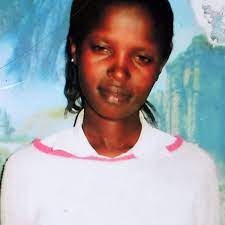Kenyan woman allegedly murdered by British soldier has been denied justice ‘because she was a sex worker’
‘We are entitled to the same rights which all human beings get,’ says Agnes Wanjiru’s neighbour

Your support helps us to tell the story
From reproductive rights to climate change to Big Tech, The Independent is on the ground when the story is developing. Whether it's investigating the financials of Elon Musk's pro-Trump PAC or producing our latest documentary, 'The A Word', which shines a light on the American women fighting for reproductive rights, we know how important it is to parse out the facts from the messaging.
At such a critical moment in US history, we need reporters on the ground. Your donation allows us to keep sending journalists to speak to both sides of the story.
The Independent is trusted by Americans across the entire political spectrum. And unlike many other quality news outlets, we choose not to lock Americans out of our reporting and analysis with paywalls. We believe quality journalism should be available to everyone, paid for by those who can afford it.
Your support makes all the difference.A Kenyan sex worker allegedly murdered by a British soldier has been denied justice because sex workers are routinely unjustly refused rights, a neighbour of the dead woman has warned.
Agnes Wanjiru, a 21-year-old Kenyan sex worker, is alleged to have been killed by a British Army soldier in March 2012.
The soldier told a fellow squad member he killed Ms Wanjiru - whose body was found with stab wounds - before placing her in a septic tank at a hotel in Nanyuki, central Kenya, according to recent media reports.
Maryanne Wanjui, her neighbour, told The Independent: “We did not get justice because even after reporting, there was no action taken by police.
“Sex workers don’t have power. People think, as sex workers, we don’t have rights. But we are entitled to the same rights which all human beings get.
“We want the man to be brought here to Kenya to deter any other men who would harm sex workers.”
The campaigner, who was a member of the same sex workers support group as Ms Wanjiru, said she was left “worried” for her own safety in the aftermath of the death.
“We felt sad because she had left a five-month baby girl,” she added. “Women went to work feeling afraid. It makes you feel like you can be killed at any time.”
Ms Wanjui, who is part of Laikipia Peer Educators, a sex workers rights group in Kenya, argued no one should feel able to “violate” sex workers because of their “job description”.
She added: “We are mothers, we are sisters, we have brains, we have blood in our veins. Most of the time, we have to depend on ourselves. It's up to us to make sure that we hustle and ensure that we have money for our children and for what we need.
“Most of the time when sex workers are murdered, no one comes out to speak about it and no one follows up on anything about their murder. We are proud that this killing has been taken up internationally.”
A hotel employee discovered Ms Wanjiru’s body near a British Army training camp two months after she was seen exiting a hotel bar alongside two soldiers – the last time she was seen in public.
Lulu Muthoni, chair of All Africa Women’s Group, told The Independent the first time Ms Wanjiru’s daughter, who is now 10 years old, learned of her mother’s death was recently via watching the news and hearing discussions in the local community.
“Before this story broke out on the national TV, she didn’t know. The girl thought Anges’ sister Rose was her mother,” she added.
Ms Muthoni, who lives in London, described Ms Wanjiru’s daughter as “very bright, free and happy” as she warned sex workers around the world face great stigmatisation.
She added: “Many women will testify injustices to the police. If you are a sex worker and you go to report rape or harm done to you, they don’t go after the attacker, they put it on you and say you have instigated what happened to you.”
Ms Wanjiru’s family have launched legal proceedings against the Ministry of Defence. While Njeri Thuku, a Kenyan judge, ruled in 2019 that the young woman, who worked as a hairdresser but started doing sex work to help feed her daughter, had been murdered by one or two UK soldiers.
A spokesperson for the Ministry of Defence said: “The jurisdiction for this investigation rests with the Kenyan Police, and we are continuing to work closely with them and provide all possible support.
“This remains an active investigation with multiple lines of enquiry. In order to protect the investigation, and in the interests of justice, we cannot comment further.”
While Niki Adams, a spokesperson for the English Collective of Prostitutes, a London-based campaign group, said she is fighting for justice for Ms Wanjiru.
The campaigner will be gathering alongside sex workers and campaigners outside the Ministry of Defence in London to protest the murder of Ms Wanjiru on Friday. Activists are coming together as 17 January is the International Day to End Violence Against Sex Workers, which sees sex workers who have been murdered, abused and raped commemorated.
“Sex workers in Kenya are demanding the same as we want here,” Ms Adams said. “They want decriminalisation. Under criminalisation, our lives are devalued. And they want the police to protect sex workers and help us get justice rather than persecuting us.”



Join our commenting forum
Join thought-provoking conversations, follow other Independent readers and see their replies
Comments